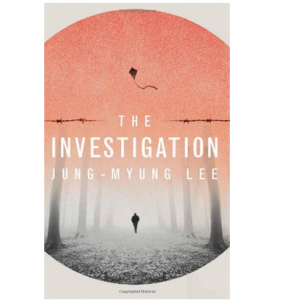 The Investigation, by Jung-myung Lee, is a crime-thriller, wrapped in a historical novel, with strong aspirations to literary fiction. It hits the first two points straight on the head, making it an ideal beach read for what remains of this summer. If it partially fails at its greater literary intention, it is not for lack of trying.
The Investigation, by Jung-myung Lee, is a crime-thriller, wrapped in a historical novel, with strong aspirations to literary fiction. It hits the first two points straight on the head, making it an ideal beach read for what remains of this summer. If it partially fails at its greater literary intention, it is not for lack of trying.
The novel is set in a prison camp in Fukuoka near the end of World War II and its historical aspect focuses on the prison camp life, and death, of Korean poet Yun Dong-ju, who did in fact perish in a Japanese prison camp. A young Japanese guard, Yuichi Watanabe, is tasked by his boss with uncovering the murderer of another Japanese guard, Sugiyama, who is killed in brutal fashion, hung, and his lips sutured shut. Sugiyama was a brute, the miracle survivor of a massacre and a man feared by all prisoners and other guards. Watanabe, on the other hand, is in parts innocent and clever, and when he unearths, and gets a confession from, the murderer, the crime drama is only beginning.
As Watanabe traces the roots of the murder, he also uncovers other historical crimes, an audacious escape attempt by Korean prisoners, the extent to which literature can affect even the most hardened heart, and some surprising revelations about many other characters, including an evolving understanding of the brute Sugiyama, and why Sugiyama acted as he did. In the course of this Watanabe, and the reader, are treated to several entertaining reversals and unexpected reversals.
In the course of this excellent tale, Lee also manages to fit in quite a great deal of history, introducing an entire slice of history, both Korean and Japanese, that is relatively unknown in the west. This is a wonderful skill, as the history goes down easily in the service of propelling the story along.
Occasionally, in the service of advancing the plot, characters do things that seem too audacious for their characters and sometimes borderline suicidal. Also, no schemes are too grand, and coincidences and unlikelihoods do arise occasionally (literal “bookworms”, for instance, herald one key plot point). But this is a very normal thing for crime mysteries / historical novels (take, for example, Dan Brown – in fact, take him to the lake and toss him in^^) and they do nothing to slow down the story, which develops at a fast pace and keeps coming up with amusing and interesting twists.
The poet Yun Dong-ju, who emerges slowly, turns out to be the central character around which the other narratives are composed, and he was an interesting enough character in real life, writing only one book of poetry, “Sky, Wind, Star, and Poem” (하늘과 바람과 별과 시), which, for obvious reasons, was not published in his life, but was published after the Japanese defeat as The Heavens and the Wind and the Stars and Poetry of which a small number of copies are available on Amazon.
One amusing point, though I’ll need to track down the original Korean to see if it is true in the original Korean, is the evil doctor in The Investigation” seems to have been named after Korean lawmaker Masahiro Morioka, who was characterized by a US expert as “trying to whitewash the things that happened in the atrocities in WWII.”
Amusing if true.
Lee also grapples with the potential roles of literature in society, beginning with a range of characters who instinctively distrust it, including a hard-core Japanese soldier/guard and a Korean rebel. Watanabe, having grown up in a bookstore, is a hard-core believer in the, if not redemptive powers of literature its power to allow us to escape brutal reality and conceive of another one. This theme is worked hard through the book and the truest anti-literature characters are in fact converted by literature into some sort of understanding of it, its power, and eventually they become humanized by it.
And yet….. by the end of the novel no one is saved by literature, and in fact no outcomes seem to have been changed by it. The bitter, hardcore men who run Japanese society and the prison camp ‘triumph’ insofar as one can say that losing a war is a triumph. It’s a split decision at best, and I wonder if that is what Lee was intending to say.
This is another brilliant translation by Chi-young Kim, who has a habit of that sort of thing (Please Look After Mom by Kyung-Sook Shin, Your Republic is Calling You by Kim Young-ha, and The Hen Who Dreamed She Could Fly by Hwang Sun-mi, to mention only three), but the book (at least the edition I have) is marred by an increasingly serious string of editing errors that break the flow of the story. Really, they should have sent me a copy before publishing and I could have saved them a bit of trouble.^^
That is a minor cavil however, and most readers will begin this story, immediately get sucked into the procedural plot, and carried happily along as the story broadens and extends. This is one of those few translations of Korean literature that I feel I could safely recommend to almost any reader.


